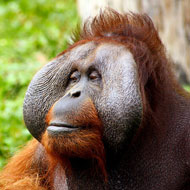Palm oil ban could worsen biodiversity loss - report

Orang-utans, gibbons and tigers are suffering severe harm as a result of palm oil production.
Banning or boycotting palm oil could further damage biodiversity, as alternative crops require even more land, a new report has warned.
The IUCN report, Palm Oil and Biodiversity, confirmed that orang-utans, gibbons and tigers are suffering severe harm, while 193 species classes as ‘threatened’ on the Red List of Threatened Species are impacted by palm oil production.
Other oil crops that could replace palm oil need up to nine times as much land to produce. This would significantly increase the total land area used for vegetable oil production, in order to meet global demand.
Furthermore, alternative crops could damage other species and ecosystems, researchers warned. The impacts of palm oil currently converge in Malaysia and Indonesia but could spread to tropical Africa and America as production increases to meet demand.
Lead author of the report, Erik Meijaard said: “Palm oil is decimating South East Asia’s rich diversity of species as it eats into swathes of tropical forest. But if it is replaced by much larger areas of rapeseed, soy or sunflower fields, different natural ecosystems and species may suffer.”
Areas that palm oil production could expand to are home to 54 per cent of the world’s threatened mammals and 64 per cent of its threatened birds.
Meijaard added: “To put a stop to the destruction we must work towards deforestation-free palm oil, and make sure all attempts to limit palm oil use are informed by solid scientific understanding of the consequences.”
Potential solutions
IUCN director general Inger Anderson said there are “no simple solutions”. However, the report recommends better planning of new oil palm plantations to avoid clearing tropical forest and peatland areas; as well as improved management of forest patches that are left untouched on plantations.
Certified palm oil has been found to be marginally better in preventing deforestation, compared to non-certified, but researchers said this fairly new approach could have potential. Improved consumer awareness in India, China and Indonesia - where most palm oil is consumed - could increase demand for certified palm oil.
The report also urges governments to protect forests in countries producing palm oil and other oils; and to limit the demand for non-food uses, including biofuel.
Further research next year will look at the social and economic impacts of palm oil production.



 The Veterinary Medicines Directorate (VMD) is inviting applications from veterinary students to attend a one-week extramural studies (EMS) placement in July 2026.
The Veterinary Medicines Directorate (VMD) is inviting applications from veterinary students to attend a one-week extramural studies (EMS) placement in July 2026.